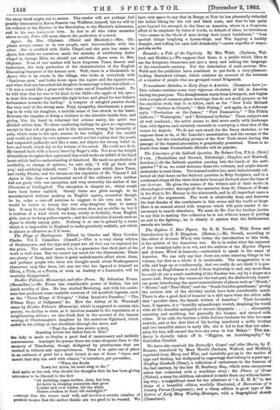The Orpheus C. Kerr Papers. By R. H. Newell. With
Notes and Introduction by E. P. Hingston. (Rotten.)—Mr. Newell, according to the editor of Artemus Ward, who writes the introduction to this book, is the satirist of the American war. He is in satire what the autocrat of the breakfast-table is in wit, and the authors of the Bigelow Papers and Artemus Ward in humour,—authorized to speak in the name of America. We can only say that there are some amusing things in his volume, but that as a whole it is intolerable. The exaggeration is so wild, and kept up so continuously, that we really do not think it is pos- sible for an Englishman to read it from beginning to end, any more than he could sit out a comic rendering of the Russian war, say by a singer at a music-hall. Perhaps the verses are the best part, the distinctively Ameri- can poem introducing the queer nomenclature of places such as "Skunk," "Misery," and "Tear-Shirt," and the "South Carolina gentleman," giving the reverse side of the chivalry medal, have both considerable merit. There is also a good deal of humour in a skit upon what the editor calls that "peculiar class, the female writers of America." Their favourite hero, it appears, is a "horridly misanthropic wretch, despising the world
with all the dreadful malignity of chronic dyspepsia alternately caressing and snubbing, but generally the former, and stained with crime. If he calls the heroine a little fool her fondness for him becomes ecstatic, and at the first hint of his 'having murdered a noble brother and two beautiful sisters in early life, she is led to fear that her ador- ation for him will exceed the love she owes to her Maker." This ten- dency is cleverly taken off in "Higgins, an Autobiography," by Gushalina Crushat.


































 Previous page
Previous page